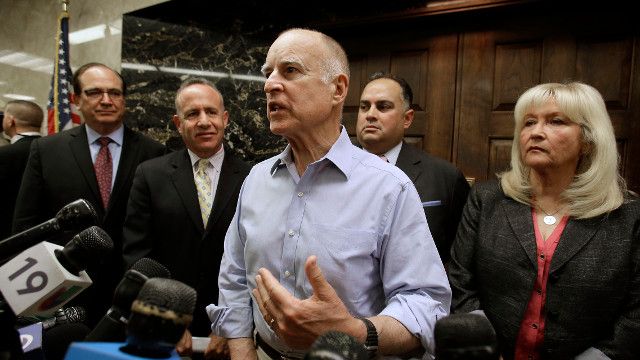
Every week Moyers & Company producer Gail Ablow shares her must-read money and politics stories.
Jerry Brown signs law requiring political nonprofits to identify donors –> California governor Jerry Brown signed a bill last week that cracks down on anonymous donations. Nonprofit groups will have to disclose the names of donors who contribute $1,000 or more to support political activity in California (if the nonprofit makes contributions of more than $50,000 in a year). Laurel Rosenhall of the Sacramento Bee reports that the bill was inspired by the 2012 election when two “dark money” nonprofits spent $15 million to influence several California ballot measures. A watchdog group learned that the groups, based in Arizona and affiliated with the Koch brothers, had violated California law by not reporting their contributions correctly.
A Senate race about…climate change! –> Democratic Representative Gary Peters, running for Senate in Michigan against Republican Terri Lynn Land, is making climate change a key issue. He is convinced by the scientific evidence that human activity is the cause and he is worried. “Michigan is on the front lines of climate change with our Great Lakes and economic system,” Peters told Greg Sargent at The Washington Post. Land, on the other hand, sent Sargent a statement conceding only that she disagrees on the “extent” to which humans have caused the problem. Sticking up for her skepticism is Americans for Prosperity, the dark-money nonprofit founded by the Koch brothers; the group is spending millions on ads attacking Peters. The Koch brothers are concerned that regulating emissions — or cleaning up those large piles of petroleum coke reportedly left by Koch Carbon along the Detroit River — might harm their bottom line. Environmentalists are encouraged to see Peters turn climate skepticism into a political liability.
What Ben Sasse’s win in the Nebraska Republican primary means–> We’ve read a lot this year about the internecine battles in the Republican primaries. At The Atlantic, Molly Ball calls it “The Dynamic,” in which “the embattled GOP establishment” is pitted against “those troublemakers in the tea party trying to take them out.” Seventeen outside political groups tried to use the dynamic to help them decide whom to back and whom to attack in the Nebraska Senate primary. More than $3 million went into the races – $1.4 million of it to support Ben Sasse, a former Bush official, and half a million of it to attack Shane Osborn, the state treasurer, reports James Hohmann of Politico. But neither quite fit the narrative mold. FreedomWorks actually thought Osborn was more tea party at first, until Sasse was winning and FreedomWorks switched horses late in the game. All of the outside investors in this competition raced to claim victory in order to appease their activist donors. But Ball concludes that Sasse isn’t really an angry anti-incumbent tea party candidate; he’s actually a “well-credentialed insider who can convince the right wing he’s on their side.” It’s possible that the only dynamic playing out in this race was that the savvier candidate won over big-money conservative groups based in Washington, DC, and won.
Coakley: Super PACs should disclose donors earlier –> At least six new super PACs have cropped up in Massachusetts since the beginning of this year. And, as the race for governor grows more and more contentious, one of the democratic candidates, Attorney General Martha Coakley, called for a change in state campaign finance law. The AP reported that Coakley wants super PACs to be required to disclose their donors and expenditures more frequently. “Voters are entitled to know who is supporting or opposing a candidate. This simple change will make that possible,” she wrote.
Contractor giving soars 28 percent in bid to block defense cuts –> Next year, automatic federal spending cuts are scheduled to begin trimming $1.2 trillion from the federal budget over the next decade. Agencies are already tightening their belts and the lawmakers elected in the midterms will be deciding the fates of heavyweight defense contractors. Jonathan Salant at Bloomberg reports that the top 10 defense contractors have been boosting their political spending to the tune of $13.7 million in PAC contributions in the last 15 months, up from $10.6 million between January 2011 and April 2012. To see who is raking in this money, pay a visit to OpenSecrets.org.
Spending on negative Obamacare ads significantly outpaced positive ones –> A new report finds that the amount of local TV ad money spent to attack the Affordable Care Act since it was enacted in 2010 has reached a historic high. According to estimates of analysts at Kantar Media CMAG, $445 million was spent on ads mentioning the law and the ratio of negative ads to positive ones was 15:1. The AP’s Carla Johnson reports that opposition to the Affordable Care Act unites Republicans and conservative independents more than any other issue. The upcoming election will be the third in which Obamacare is eclipsing other issues, but it will be the first election in which 8 million people actually have the insurance. So far the law’s political supporters are barely fighting back.


